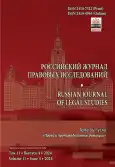Транспарентность промежуточной оценки доказательств как необходимое условие обеспечения состязательности в гражданском судопроизводстве
- Авторы: Столповских Н.О.1
-
Учреждения:
- Воронежский государственный университет
- Выпуск: Том 11, № 4 (2024)
- Страницы: 107-112
- Раздел: Частно-правовые (цивилистические) науки
- URL: https://journal-vniispk.ru/2410-7522/article/view/286388
- DOI: https://doi.org/10.17816/RJLS642392
- ID: 286388
Цитировать
Аннотация
Цель исследования состоит в обосновании необходимости обеспечения транспарентности промежуточной оценки доказательств, а осуществляемой судом. В рамках данной работы критикуется подход, допускающий дискрецию суда при решении вопроса о том, необходимо ли предлагать лицам, участвующим в деле, представить дополнительные доказательства. Признаются ошибочными аргументы, которые приводят сторонники пассивной роли суда в процессе оценки доказательств: гласная предварительная оценка достоверности и достаточности доказательств не приведет к нарушению принципа состязательности, а напротив, создаст условия для наиболее полной его реализации, будет способствовать всестороннему, полному и правильному выяснению действительных обстоятельств дела.
Выводы. При рассмотрении гражданско-правового спора именно суд должен задавать вектор доказательственной деятельности, определять направления собирания, исследования и оценки доказательств посредством раскрытия результатов их промежуточной оценки. Предлагается внести изменения в процессуальное законодательство: установить обязанность суда предложить лицам, участвующим в деле, представить дополнительные доказательства при наличии сомнений в их достоверности и (или) достаточности.
Полный текст
Открыть статью на сайте журналаОб авторах
Никита Олегович Столповских
Воронежский государственный университет
Автор, ответственный за переписку.
Email: n.stolpovskih@yandex.ru
ORCID iD: 0009-0009-2957-3113
SPIN-код: 4906-1750
аспирант
Россия, ВоронежСписок литературы
- Курылев С.В. Избранные труды. Минск: Промышленно-торговое право, 2012. 607 с. EDN: QSQFLD
- Эйсман А.А. Заключение эксперта. Структура и научное обоснование. Москва: Юридическая литература, 1967. 152 c.
- Трусов А.И. Судебное доказывание в свете идей кибернетики. В кн.: Вопросы кибернетики и право / под ред. Кудрявцева В.Н. Москва: Наука, 1967. С. 20–35.
- Кудрявцев В.Н., Эйсман А.А. Кибернетика в борьбе с преступностью. Москва: Знание, 1964. 80 с.
- Шевченко И.М. Стандарты доказывания: к вопросу о понятии // Арбитражный и гражданский процесс. 2024. № 4. С. 23–28. EDN: TLHCNT doi: 10.18572/1812-383X-2024-4-23-28
- Комментарий к Гражданскому процессуальному кодексу Российской Федерации (постатейный). 3-е издание / под ред. В.И. Нечаева. Москва: НОРМА, 2008. 974 с.
- Баулин О.В. Бремя доказывания при разбирательстве гражданских дел. Москва: Городец, 2004. 272 с. EDN: RTAIGT
- Фогельсон Ю.Б. Российское гражданское право с точки зрения социологической юриспруденции (стандарты доказывания, возмещение вреда жизни или здоровью) // Закон. 2020. № 1. С. 160–170. EDN: HOJDFR
- Ретхер В.В. Проблемы реализации принципа состязательности в арбитражном процессе // Вестник Высшего Арбитражного Суда РФ. 1999. № 11. С. 96–99.
- Буня М. О судейской беспристрастности // Социалистическая законность. 1953. № 7. С. 31–35.
- Треушников М.К. Судебные доказательства. Москва: Городец, 2004. 272 с. EDN: QVSDUL
- Россинский С.Б. Средства доказывания в уголовном судопроизводстве // Юридический вестник Самарского университета. 2023. Т. 9, № 1. С. 37–45. EDN: CPVQUV doi: 10.18287/2542-047X-2023-9-1-37-45
- Жуков А.А. Правовые средства воздействия суда на процессуальное поведение сторон в гражданском судопроизводстве: дис. … канд. юрид. наук. Москва, 2022. EDN: MEJFJP. Дата обращения: 07.12.2024. Режим доступа: https://izak.ru/upload/iblock/b64/Kandidatskaya_dissertatsiya_AA_ZHukova.pdf
- Алиэскеров М. Принцип состязательности и юридическая помощь в гражданском процессе // Арбитражный и гражданский процесс. 2006. № 3. С. 2–6. EDN: KWXUNV
Дополнительные файлы






